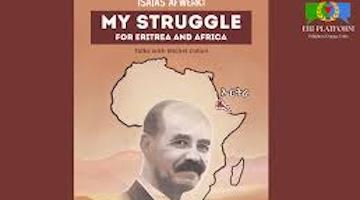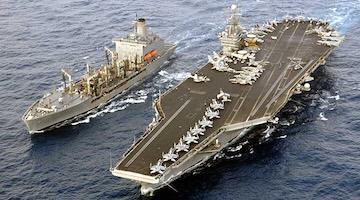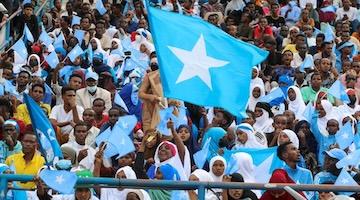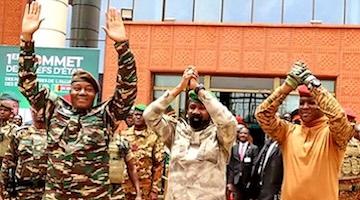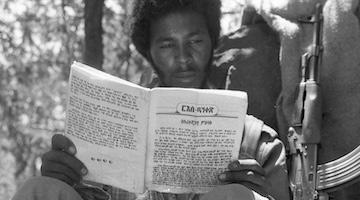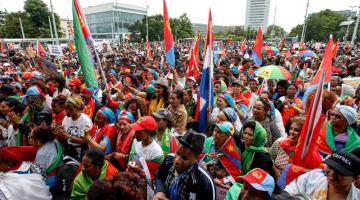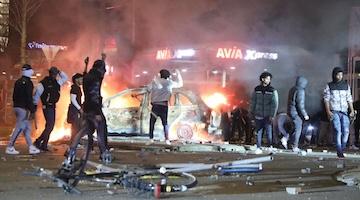Journalists interview Eritrean President Isaias Afwerki (Photo: Ministry of Information Eritrea)
The president of Eritrea gives a wide ranging interview on the U.S. regime change effort against neighboring nation Ethiopia using the TPLF, and long-standing U.S. hostility towards his country.
This article was originally published in the Ministry of Information Eritrea.
Q1. In your interview last year, you had indicated that the TPLF’s reckless adventures had been foiled, even if its Enablers continued to dwell on their subversive campaigns. As you had predicted, the TPLF unleashed its third offensive (in August last year) during the critical harvest season as it was invariably the case with the two previous offensives. The TPLF was subsequently compelled to sign the Cessation of Hostilities Agreement. What were the political and military developments that underpinned this event? What is its likely trajectory in the period ahead?
A. When broaching this subject, the first question that comes to mind is why was war necessary in the first place? And, what was the rationale for launching the third adventurist offensive? It is imperative to examine the dynamics of the preceding reckless offensives in order to properly gauge and understand the third and final gambit.
As I stressed earlier, the crucial question is why this war was launched in the first place at a time when a Peace Agreement was signed. In our view, this was not really a TPLF agenda; but essentially the agenda of Washington. The sad fact is, perturbed and anxious as they were by the advent of peace between Eritrea and Ethiopia, impeding and scuttling it became their dogged obsession. The vehicle of choice to implement this wicked agenda was their subordinate – the TPLF clique. The TPLF was subservient to their agenda for almost thirty years thereby plunging Ethiopia into a quagmire. The TPLF had done its part as a loyal surrogate in those decades. Finally, it was utterly incapacitated and became a spent force. Nonetheless, its Enablers did not abandon their agendas. When it was said GAME OVER, the thrust of their actions focused on resuscitating the TPLF and their agenda. The schemes that were being concocted were transparent to us.
As I explained on previous occasions, I was not keen to meet the Chief of the TPLF clique during the celebratory occasion in Omhager. But eventually, I decided to meet him briefly – for a couple of seconds at most – to ask him why they were making preparations for war. I told him, “I am baffled; What are your intentions in going to war? His response was “this is not going to happen…it will not happen”. This was not, really, an honest response.
Soon after, the reckless adventures ensued including missile attacks on Asmara. They had mapped out 72 targets for missile attacks against the country. The full details will be divulged at the appropriate time. In a nutshell, it can be summed up as the reckless gamble of a bankrupt merchant. Of course, they had made necessary preparations. The end game was to disrupt the conducive climate of peace and impose a new reality of chaos and instability. The military offensives stemmed – as it was graphically depicted in the play during the Fenkil celebrations yesterday – from miscalculation. The presumptuous assessment by Washington further amplified and multiplied the TPLF clique’s erroneous perspectives. They unleashed the offensive expecting huge results. Bombing Asmara with missiles cannot have substantive military impact. Yet the US Embassy in Asmara amplified it with its megaphones in a celebratory tone.
There is nothing new or novel to us in TPLF’s unbridled conduct which is akin to a bankrupt merchant who wallows in yet more gambles. Furthermore, the TPLF has external Enablers and masters. Its main task is to do their bidding; to implement their express instructions.
The first phase of the TPLF’s initial offensive ended in a debacle. I will not delve into greater details on the dynamics and specifics of how the first offensive was foiled. They should have drawn appropriate lessons from this utter failure. But its Enablers concocted various subterfuges to salvage the TPLF clique.
The second option that was developed subsequently was to attack Wollo and Combolcha and enter Addis Abeba. All the accompanying themes and dramas were meticulously prepared. The propaganda that was floating was that this was indeed a second chance. What could the TPLF achieve by spreading itself in a vast area, in a huge morass? In retrospect it is clear that this was a disastrous folly. Only a fool will keep playing when the game is finished. The sheer size of the army they had amassed through extensive and forced conscription might have been a factor that misled them. They pinned their hopes on outnumbering the Federal Army. These were the calculations that they reached in their closed circle. But the outcome was predictable. The outcome that would accrue when operating in unfamiliar and expansive terrain extending to Addis Abeba cannot be lost to a sober mind. This was utter insanity. As it happened, the offensive met utter failure.
And yet, TPLF’s Enablers concocted another ploy. They pressed for the termination of the counter-offensive campaign and to hinder its advance to the Tigray Region. This was inexplicable by any standards. But it was evident that this would lead to the launching of the third offensive. Indeed, old habits die hard and the pattern or playbook was in any case the same.
Frantic preparations for the third round of the military adventure, which was dubbed “final and decisive,” continued in full swing. A large army was amassed through coercion, deceit and intimidation. The preparations, including the propaganda, were reminiscent of the fanfare during the Dergue’s regime. The pomp and insanity was hard to fathom. They had sustained major defeats in the two previous rounds. Their desire was now not to miss the opportunity in the third round. I attribute this agenda to the clique in Washington and its ilk elsewhere. The only vehicle of implementation was of course the TPLF clique. The TPLF had no problem to advance external agendas by agitating the people of Tigray through deceitful promises and dreams.
In the last military adventure, the plan was to open new fronts in the eastern and western flanks in addition to the northern and southern fronts. The preparations that were made on Sudanese territory were enormous both in terms of magnitude and capacity. The intention and strategy was to open a corridor through this western front. An additional army was thus created through recruitment in the refugee camps in Sudan and from the contingents that were deployed in Darfur on a peacekeeping mission. Similarly, attempts were made to secure a corridor to Djibouti on the eastern front by inciting ethnic conflicts in the border areas. All-round preparations were thus made for over six months. Weapons and other equipment were smuggled [into Tigray] by airplanes under the cover of darkness to augment the TPLF’s military capability.
In the meantime, the Federal Army, which had gleaned vital lessons from the previous two rounds, had undertaken substantive preparations. The fact was the preparations were not adequate during the first two offensives that were unleashed by the TPLF. One element that contributed to the miscalculation of the TPLF clique and its Enablers was the notion that the Federal Army was virtually impotent. The TPLF had of course an inside track as it had incessantly worked, for almost thirty years, to weaken and fragment it. The Northern Command was an army of 30,000-32,000. Over 10,000 of these soldiers were TPLF loyalists or soldiers. To infiltrate and disarm this force in the first offensive was thus deemed as relatively easy. In retrospect, it is clear that TPLF strategy consisted of weakening and fragmenting the national army to advance its overarching objective of controlling and ultimately balkanizing the country along ethnic lines. The TPLF’s modus operandi for maintaining power rested on inciting interminable ethnic divisions and planting time bombs here and there. As a result, robust and sovereign federal institutions, including security and defense organs, were not developed. TPLF’s reckless first offensive was, no doubt, prompted by these considerations. The shallow strategy was to overrun and route these “nominal institutions” and subsequently funnel the military assault towards the North (i.e. Eritrea).
But the plan did not materialize. Although we may not quantify it at this stage, there were many who refused to surrender when the TPLF unleashed the first assaults. What transpired thereafter is of course well-known.
As I stated earlier, the Federal Army had drawn appropriate lessons from the two offensives to undertake requisite preparations for the third offensive. Still, all the variables in war cannot be foreseen in advance as they are determined by the side starts the war.
In our case, in the past eighty years of our history, waging war has never been our choice. If we went into war it has always been reactive and in self-defense.
In the first round, we cannot talk about adequate preparation to counter TPLF’s adventures. But the ensuing months provided opportunities for requisite preparations. In Ethiopia, in particular, it afforded opportunities for greater popular awareness as well as more effective operational capacity. Based on the lessons learned from the two previous rounds, we were able to synchronize our operations.
War has never been our choice. Accordingly, we need to work together to deny the capability to those who continue to disturb peace in the region by unleashing incessant wars against us. Deterrent action was thus imperative to ascertain peace and stability in the region
The operational changes made had tangible contributions. In addition, we possessed detailed information of what they envisaged. This was critical to our preparations. The task consisted of collecting vital information and meticulous monitoring of their movements and force- deployments until they initiate the military assault. This state of affairs continued for almost six months. The third round was dubbed by them as “final and decisive”. Likewise, this was also our position. The view was that this round should be consummated, and not be halted in mid-stream in order to avert another disastrous adventure.
The problem is they don’t know their capability. They live in a fantasy world. Their advisers and masters are even worse. The clique in Washington are clueless about the reality on the ground. Their situational analysis is flawed. They dubbed the third round “final and decisive”, because deep down, they believed in it. So, to make it a lesson for everyone, to bring the war to an end and for genuine peace to prevail, adequate preparations were made to foil their schemes.
Developments on the ground were really dramatic. The preparations of the counter-offensive were substantial. When the war began, it did not take much time. The losses inculcated on the TPLF within a short period of time was colossal. Within three weeks, TPLF’s leadership began to wail and make preparations to flee from the country. The developments on the ground were swift and forceful. This caused panic not just within the TPLF camp but more so in its Enablers. They began crying out for help and asked to be rescued. A meeting was arranged to be held in Pretoria on 24 October. The US military base in Djibouti sent an aircraft to Mekele to pick up TPLF’s negotiators who were taken to Djibouti and then to Pretoria on another flight.
There, they were presented with a document and asked to sign it. It was all arranged by the clique in Washington. The AU envoys – Obasanjo, Uhuru – were there for cosmetic purposes. The whole scheme revolved around halting the military progress and advances of the counter-offensive in the field in Shire, Aksum, Adwa, Adi-grat,… Mekelle etc. TPLF was severely downgraded and reduced to seeking rescue from its Enablers who obliged accordingly.
One can ask why the meeting was held in Pretoria and not in some other place; and why the subsequent meeting was held in Nairobi. Anyway, through the Djibouti operation, some members of the TPLF clique were taken to Kampala while others were taken to Pretoria to sign.
In short, the plan for halting the counter-offensive was implemented. But so long as they are fully disarmed and put in camps, there’s no need for continued war. The implementation process must be monitored fully. Washington’s principal preoccupation was to rescue the TPLF from the abyss and create a new condition for them to survive and gradually look for other potential options. But there is no need to be alarmed by this. It is good that an agreement has been made, and it should be implemented. Until the agreement is implemented, we cannot comment further. We will not prematurely say that it is all done as we know TPLF’s track-record and its propensity to revert to its old tricks.
The new tactics we now see is bidding for time using lame excuses. To this end, they are peddling new claims alleging that “’Eritrea hasn’t pulled out [its forces… it’s killing people and looting property … there is the issue of Welkait…etc.’’.
The ploy, until yesterday, is to use flimsy pretexts to delay the implementation of the Agreement, and, to exploit the resultant uncertainty to concoct a new scheme. This is Washington’s normative way of thinking, which is applied in other global affairs too. If you encounter an unfamiliar situation, you create chaos to buy time and then to refine and chart out new plans. This is conceivable only if there is going to be a fourth round. In reality, though, the situation will not deteriorate to that level; even if we assume that old habits die hard. The possibilities for reorganization (for TPLF) are indeed very slim. However, we will not make a premature judgement at this juncture; but we will talk about it at the right time.
We are going to closely monitor the implementation of the agreement. But generally, we can say that we are in a better position because of our endurance and the counteroffensive measures that were taken. We cannot say they will change their behavior; but the third round might have taught them a lesson. How many hundreds of thousands have died? How many have been injured? Where are they? This kind of disaster is not seen in any war. It is difficult to imagine the magnitude of the losses caused by the military adventure. It is a crime. After declaring an aimless war; plunging innocent people into a quagmire; causing huge loss of life and property; squandering much opportunity; should not there be due accountability? What does this mean? (Instead of admitting their guilt), they are looking for cover and shifting the blame to others. This is not admissible. There has to be a day when this question has to be raised. Those that are responsible have to be held accountable. It is not just about the three rounds of TPLF’s military adventures. The destruction and loss of opportunity meted out to the Eritrean people for 30 long years without accountability cannot be downplayed or shrugged off.
At the end of the day, it all boils down to the question I raised at the beginning. Why war? How can it be justified politically; even from their own perspective? Why are they conducting this war? What is the real rationale? What are the objectives that the implementers and their Enablers want to achieve? What could be its regional or global benefits? It is mind-boggling.
The ploy, until yesterday, is to use flimsy pretexts to delay the implementation of the Agreement, and, to exploit the resultant uncertainty to concoct a new scheme. This is Washington’s normative way of thinking, which is applied in other global affairs too. If you encounter an unfamiliar situation, you create chaos to buy time and then to refine and chart out new plans. This is conceivable only if there is going to be a fourth round. In reality, though, the situation will not deteriorate to that level; even if we assume that old habits die hard. The possibilities for reorganization (for TPLF) are indeed very slim. However, we will not make a premature judgement at this juncture; but we will talk about it at the right time.
We are going to closely monitor the implementation of the agreement. But generally, we can say that we are in a better position because of our endurance and the counteroffensive measures that were taken. We cannot say they will change their behavior; but the third round might have taught them a lesson. How many hundreds of thousands have died? How many have been injured? Where are they? This kind of disaster is not seen in any war. It is difficult to imagine the magnitude of the losses caused by the military adventure. It is a crime. After declaring an aimless war; plunging innocent people into a quagmire; causing huge loss of life and property; squandering much opportunity; should not there be due accountability? What does this mean? (Instead of admitting their guilt), they are looking for cover and shifting the blame to others. This is not admissible. There has to be a day when this question has to be raised. Those that are responsible have to be held accountable. It is not just about the three rounds of TPLF’s military adventures. The destruction and loss of opportunity meted out to the Eritrean people for 30 long years without accountability cannot be downplayed or shrugged off.
At the end of the day, it all boils down to the question I raised at the beginning. Why war? How can it be justified politically; even from their own perspective? Why are they conducting this war? What is the real rationale? What are the objectives that the implementers and their Enablers want to achieve? What could be its regional or global benefits? It is mind-boggling.
They have been operating through proxies to-date. The agenda and approach has not changed. The clique in Washington is not happy about the prevailing situation. So, it has to constantly create problems. If it can find an obedient servant like the TPLF clique, well and good. Otherwise, it has to look for an alternative. That has been their modus operandi. And as the global situation compounds their worries, will they ever be relieved from anguish?
A sane person would not accommodate the latest, third adventure, of the TPLF and its Enablers. It is possible for anyone to miscalculate. One may exaggerate his capacity and opportunities while undermining those of his opponent. But when you sustain very heavy losses, you have to stop. The three rounds of military adventures should be seen within the context of the past thirty years as well as the future. The question is, will they change their behavior? Will they embrace peace following the implementation of the Pretoria and Nairobi agreements? We shall see. May be some will flee. After what has happened, there is no space in Tigray where they can play the same game. And there has not been any in the first place. They might have instilled a false sense of invincibility or some other reasons to galvanize support. The last episode provides, however, a big lesson to the people of Tigray who were forced into a costly war they did not need.
The destruction caused by the war cannot be compared to any event. That is why we are insisting on accountability. Also, in order to deter similar adventures from recurring in the future. We should see the events within a broader context; and not in isolation. When we look at the events, we wonder why they are not tired of doing it; they should not have transpired in the first place.
For eighty years, they have harassed and declared wars on us that we never wanted. Can we not be allowed to live in peace as a people? Of course, there is no reason for us to ask for their permission. But as a people, we have the right to live in peace. What is the argument for the successive wars they have been declaring against us ever since they made the statement that Eritrea wouldn’t serve their strategic interests? Don’t they learn from their incessant failures? Couldn’t they change when the Cold War ended, and a unipolar world was created?
In our perspective, the game that went on for a long time came to an end with the demise of TPLF. The phrase “Game over” was not uttered casually. But like a bankrupt gambler who does not give up irrespective of his growing losses and even incurs more debt in the hope of some gains, they launched the three disastrous offensives. And we took, with patience, the required counteroffensive measures. We cannot say similar attempts will not be made in the future because we cannot speak for them. But a big lesson has been learned from the disaster. Above all, we have gained a big experience as a result of working together with the Federal Forces as one team. We can say we have shared experiences that will be helpful in building regional peace. This is a big headache for them. They do not want to see peace between Eritrea and Ethiopia. They will not stay idle. They may try to trigger a conflict between Eritrea and Ethiopia and use the resultant instability to foment other problems in the region. Somalia, Sudan, South Sudan would be potential targets in this destabilizing scheme. The current situation poses a big challenge to them. I call it a “historic challenge”. For the past eighty years, they have exploited the war between Eritrea and Ethiopia under various ruses and arrangements. The war between Eritrea and Ethiopia has served them beyond measure. The habit that they have nurtured for eighty years cannot be expected to change overnight. The loss incurred because of this is unbelievable. And if you go back in time and look at the loss, it is unimaginable. That is why it is important to assess the cumulative damage inculcated in the three rounds of military adventures within the larger context. It is a big experience; and a big lesson has been learned.
Q2. Still on the topic you have raised, there is no doubt that the situation in Ethiopia and the policies of the US and its allies, which have been affecting negatively the international and regional situation in general, have played a devastating role for the past half century. Today, in a critical transition period, the Washington administration has developed a new National Security Strategy that it says will determine the course of events for the next ten years. What can we expect from this new strategy? What might be its global and regional implications?
A. One has to always return to the source of the issue and answer key questions – who is responsible for global insecurity dating back to the pre–Cold War era and up to this day? For what purposes? These recurring questions can help one decipher the recently published national security strategy document. Superficial changes in language aside, which make it seem as if they have corrected their ways, the core attitude has not changed. In fact, a careful reading reveals hidden messages buried between the lines, all serving a specific purpose. This begs the question whether they are even willing to change; whether their culture even allows them to change.
No matter what one thinks of the Cold War era, it was a time of contentious competition between the Soviet bloc and one ruled by them, and it carried with it specific characteristics. Why did this competition need to change? Why did this change then give rise to a hostile and reckless unipolar world? What global challenges did this in turn cause over the past 30 years? What are their plans for the future? The same questions apply to the current situation with Russia.
To answer all of these questions and to understand the core characteristics that underpin this attitude one must examine their [American] history. It can all be traced back to the same mentality that saw no issue with settling in a foreign land after having wiped out an entire native population. In fact, if you look at the geographical makeup of the Americas, you cannot help but wonder about the native populations. We hear of “discoveries” in Canada and other places. You then ask, what happened to the population that was there before? You find that they were wiped out. The few that were left were then controlled. This is documented history. That is what they did everywhere they went during that time. It is the source of their supremacy.
They then resorted to importing enslaved people from Africa to develop the land. If you subtract the enormous number that drowned in the Atlantic and those that perished due to illnesses, you find that the remaining Black people living in the US today are the offspring of enslaved Africans. That is how they developed the country. The actual number of slave owners was relatively small compared to those that they enslaved but that is how they ruled the country, and all of this was considered absolutely normal to them.
Whether one is looking at the 21st, the 20th, or the 19th century, slavery, indentured labor, greed, and hegemony is at the core of the mentality that has ruled and continues to rule that system. It is, however, important to differentiate between the handful in power that have denied the world peace and stability and America as a whole, which includes the American population that bears no responsibility for these actions.
The events surrounding the end of the Cold War and the issues on the Soviet bloc’s side, which eventually led to the fragmentation of the Soviet Union, unfolded in a way that gave one side a false sense of triumph. Instead of ceasing the opportunity to work for global peace and security, however, this “triumph” led them to design a unipolar world and proclaim that the world was now under their full control; that there would be no contest in any sector (economically, technologically, militarily, etc); and that anyone who dared to rise or challenge this view, this “might”, would be dealt with and contained. In effect, all of this was a continuation of the same political culture that they used for centuries, leading one to conclude that they have always remained at the root of all global upheaval and instability.
Nothing has changed with the new strategy – whether viewed in relation to the Cold War or the outlook that gave rise to a unipolar world, the pillars remain the same. Of course, misleading words such as “competition” may have been added but the fact remains that fair competition remains an alien concept to them as they have always aimed at a zero-sum outcome. This new document simply aims to revive a unipolar world that they spent 30 years perfecting and that is now slowly but surely crumbling.
In reality, one cannot speak of the European Union at this time. Ukraine is used as a means to revive this idea. Similarly, NATO is a very weak entity that they are trying to revive using this manufactured situation. Blocking Russia from growth in key areas, especially technologically and militarily, was viewed as a mechanism to ensure global hegemony. As such, using and propping up Crimea, Ukraine, and other areas as pretext, Russia remained their key target for containment over the past 30 years in the post-Cold War era.
Ironically, and what can only be referred to as a blundered gamble, they assumed that China could be used to their advantage as the country offered a cheap source of energy, labor, and basic key industries. They swiftly moved their industries to China with the singular aim of global hegemony. What they could not foresee was China’s confident rise over the past 30 years and overtaking them in many key sectors.
Any observer can predict the next 20 years for China in relation to America and America’s partners. This in turn is giving rise to a change in tune declaring China as the new “threat” and calling to contain China. Of course, none of this is revealed in the new strategy document – a document that highlights “competition” as a key pillar when in reality, as mentioned above, fair competition remains alien to them.
Whether by design or default, this unprovoked hostility aimed at both – Russia and China – has moved these two countries closer to each other. We remain aware of this reality.
Of course, Ukraine remains a pretext with which to revive a unipolar world and eliminating any chance of other powers challenging that hegemony. The “global order” that they seek to uphold is one where they have no competition and one where they control all resources and countries.
The question then becomes will this attempt succeed? Does the current global trend allow a regression back to a unipolar world?
In my opinion, this remains a dream. In fact, the new strategy document, although it reveals their inner whims and desires, proves that they are unable to properly read global events. It is a reflection of yet another blundered gamble. Unfortunately, this has resulted in further misadventures and the resulting chaos we continue to witness at this time. This also proves that they are not interested in calmly analyzing global trends or contributing to global peace and stability. At the core of their political culture is the rule of the jungle where force is used regardless of the cost paid by humanity.
We can also point to the fact that the situation created in our region closely relates to these global developments. Recall that our Independence coincided with the end of the Cold War and the hope at the time was that perhaps the world would be in a better position to support change. Alas, the past 30 years proved the opposite. They continued to use proxies, such as the TPLF clique and others, to create chaos everywhere. Of course, proxies never take the time to think twice and always obey commands in exchange for a few pennies – this is something previously admitted by TPLF cadres. As such, one can easily conclude, whether in our region or other parts of the world, the source of instability and chaos is one and the same.
As their unipolar strategy of the past 30 years slowly crumbles, the next consideration is to try and understand what effects will the current developments have on our region. Some claim that Ukraine will once again lead to triumph, and that Russia will be defeated – this of course is illogical. Then comes the containment of China – one has to ask if that is at all feasible or logical? They are of course trying different angles to fuel chaos in the Pacific by pitting one country against the other, but this too is doomed to fail and can only be viewed as the work of a losing gambler. One must also wonder about the direction America is heading, amassing a massive debt in the ballpark of 32 trillion, printing dollars to keep its economy afloat. What of the military exhibition in Ukraine and the enormous cost that it is entailing?
As it relates to our region, the end of TPLF’s war, for example, does not mean that they will not try to find other ways to create conflict. The trend of the past proves that this mentality that thrives on global chaos will never rest. In the end, however, all we can do is remain aware of all of these developments and remain cognizant of the possible challenges they may pose and prepare for any eventuality.
As is listed in the new strategy document, there are many manufactured reasons that they will use to target other countries for “containment”. Whether Iran or North Korea or others, they will continue to make up the necessary pretext to push through their agenda. This unfortunately will never change.
The use of proxies, the desire to dominate the world and its resources, the strategy of divide and rule – one cannot expect any change as long as these remain the pillars underpinning their interaction with the world.
As a society that has borne the brunt of their hostility for 80 years, our desire for peace and stability remains unmatched in this region. We want to live in a time when war is a thing of the past. We want to achieve our development goals. We are aware that none of the plans we have come through desire alone. We have always committed to work hard. But how do we do this while facing forces that trip us at every corner and how do we do this while facing proxies that are all too willing to serve external agendas? All of these challenges require careful considerations. This also requires us to work in solidarity within our region and with other regions that promote peace and stability. This of course does not mean that we can ignore them and their ways. We cannot afford to. In fact, we need to fully understand what it is that they are planning and how it affects us all. The peace and stability that we want to promote and build between us and Ethiopia and our region in general must take this context into consideration. As such, the events of the past two years should not be viewed in a vacuum but as part of global trends and within the larger global context.
Q3. Your Excellency, you have already mentioned hostilities that have been waged against Eritrea by the US administration for the last 80 years. Is there any hope for substantial changes in rectifying misguided US policies toward Eritrea in light of the so-called New Foreign Security Strategy?
A. A thorough reflection of history leads one to conclude that there would be no change in their policy. In fact, it is striking to witness such repeated futile ploys that in the end do not benefit anyone. It is really difficult to understand why they would continue to engage in juvenile acts that do not reflect their global status and the expectation that comes with their strength.
During Trump’s administration, we chose to engage believing that perhaps there was room to clarify our historical position and the unprovoked hostility and aggression against Eritrea lasting 80 years. We sent a factual memorandum detailing every wrongdoing since 1941 and up to this day. This initiative was anchored on the belief that perhaps they could learn from repeated misguided policies. Trump responded by saying “I may not agree with everything you have said but I willing to work with you in the future”. Again, we did not do this expecting change but to have our version of history recorded in their files.
It is worth noting that some powers did reflect on their past misdeeds and have shown interest in adjusting their ways. Unfortunately, at the time of decision making, these powers take a back seat and the ones that dominate the mediums are the same powers that have repeatedly been on the wrong side of history, caring only about their own fantasies and agendas.
It is also worth noting that when we speak of unprovoked hostilities and wrongdoing, we do so not only in our name because this is not unique to us alone. We always recognize that others in Africa and other parts of the world have also been victims of these misadventures. In fact, we recognize that we may be at the very end of their list of targeted countries. Having understood all of this, it becomes difficult to expect major change in their policy or that they would ever shift from this dangerous track record.
Nevertheless, we must commit to sustainable peace and stability – and we must commit to do so in spite of their aggressions. This is something that requires relentless work and cannot be achieved simply by wishing for it or by trying to work with and correct them.
The challenges experienced in different regions of West, South and North Africa, in our region, as well as in the Middle East, are all similar. To understand the whole jigsaw, one must put all the individual pieces together after studying each piece separately. This would help explained that all the issues in our region – in the Red Sea, in the Horn of Africa, the Nile basin, and in the Gulf region – are the result of interference and manipulative exploits. As such, the situation in the entire region affects us all, collectively.
The different blocs within this region are all interdependent and the economic, development, and security sectors in each all complement and affect one another. One cannot analyze issues in one area separately and if one makes an effort to understand the situation as a whole, one finds that all challenges lead straight back to powers that have an interest in sowing conflict. They may do this directly or indirectly through small or large proxies.
Having said this, we must remain alert at all times, continuously analyze the situation unfolding around us, prioritize our efforts based on the reality, and in the end, we must commit to not only withstand these challenges but to move past them and march forward.
The experience of Eritreans and this society’s ability to withstand all challenges over the past 80 years is worth studying. Eritreans were able to achieve all that they have relying on their own resources and through peerless martyrdom and perseverance. These past 80 years are characterized by a unique sense of resilience – something left for history to bare witness. We need to maintain this history of resistance and resilience, which is why it is important for us to remain alert to their conspiracies and strategies.
This of course leads to a new set of questions – what will be the end of the situation that has been witnessed in Ukraine? What would be the fate of fronts they have been creating in other locations? How are they planning to manage? How will their plans against rising powers pan out? What would they gain from such acts? All of this is assuming there would be no change in their strategic plans and ideologies.
NATO was haphazardly revived and restructured. It is important to note that this was not the result of a planned or orderly decision but rather in reaction to new and unforeseen events that they deemed as threats. Ukraine was used as the necessary pretext for this and is providing an excuse for their objectives. The issue of Sweden and Finland joining or not joining NATO is just part and parcel of the disorderly attempt to expand NATO’s size and to give life to the already dead organization. NATO’s existence is now being questioned. The European Union itself does not exist and it is no longer functional. What is being disseminated through media outlets is repeated ad nauseam with no new agenda.
The silver lining in all of this is that the unipolar world order that they have been preaching about and protecting for the past 30 years has been dismantled and this has paved the way for a better global situation. Of course, it would not be realistic to imagine drastic change overnight or even within a year or two but the trend is leading towards a better future.
This will cause spasms on their end, especially when they realize that the powers that they have tried to control and contain are now out of their reach. They may then try to design new plans but it would be too late. The path they are currently on is literally driving them to the edge of the cliff.
The ideology that kept the Cold War afloat has expired. They then spent the next 30 years destabilizing the world. These efforts may continue in the future. What matters at this point is what will we do in such circumstances? What will other partners who have also suffered from such hostilities do? What can we do collectively to deter such scenarios? Because, again, we cannot expect them to change their ways as it unfortunately seems to be a chronic illness that has no remedy.
Q4. Mr. President, you have repeatedly mentioned that the global order has been subjugated by powers guided by greed and dominance. But there has been a growing awareness in the countries of the Global South and demands for a new and balanced international order. What are the prospects of such developments and what is Eritrea’s stance toward such a scenario?
A. As mentioned earlier, the hostility and efforts to control, stifle and contain both Russia and China have resulted in these two powers moving towards one another and working closely together. This has not crystallized to assume meaningful institutional form, but still remains a reactive and natural response or trend than can grow with time. We then need to examine what the overall developments in China, Russia, India and other small countries of the world would look like. What is yet not clear, for example, is whether Japan is content or not with the policies of the clique in Washington. Would it benefit from continuous confrontation within that neighborhood? Would the confrontation between South and North Korea continue with the same momentum? The alliance that has been attempted to be fostered among Japan, South Korea, and India with Australia’s backing is not accepted by the region.
It is important to note that the demands for peace and stability among the people of the Global South is growing. It would be wrong to assume that ordinary people cannot read global trends and cannot understand larger geostrategic maneuverings. Unfortunately, the powers engaged in manufacturing chaos are not interested in paying attention to these demands and the fact that these developments have generated wider and increased awareness and people from all corners of the world are saying enough is enough.
After the end of the Cold War, the powers that promoted containment were actively engaged in promoting terrorism and supporting terrorist organizations. In fact, terrorist organizations that rose in the past 30 years are directly and indirectly linked to these powers of dominance and the proponents of the unipolar world order. The crisis and destruction that has been witnessed everywhere, including in our region, is the result of these antics. The so-called fight against terrorism was insincere and a tool for deception. Terrorism was created by them. Apart from the terrorist attack of 9/11, the Global South has been the victim of such intimidations. Hunger was another tool worsened by endless crises created by such malicious policies. This part of the world has been greatly affected by the global strategy of the clique in Washington.
Africa has a population of 1.2 billion and the situation may become even more complicated with an increase in population and with ever intensifying interventions and turbulences created by these external forces. The situation in Latin America is similar.
In short, the Global South has been marginalized and the challenges made more complicated by interference and misguided policies.
As a result of and in reaction to these developments, awareness is increasing and populations in the Global South are continuously questioning the reasons for their underdevelopment, worsening living standards and the numerous other challenges they have been facing. They have been demanding a new global order. It is a natural outcome of years of suffering. It is also expected that this awareness will give rise to growing resistance in the Global South in the coming decade or two. We are literally left with no other choice but to resist and to find ways and mechanisms of eliminating the obstacles that stand in our way to our development, peace and stability.
It therefore comes as no surprise to now see last ditch efforts aimed at attracting Africa. Summits have been organized in Europe and America. Africa-America summits have been organized by the clique in Washington. All of this is a reaction to the rising levels of awareness and resistance. It is a last ditch effort to try and undo the tide of resistance. Such attempts have also been exercises to gain the hearts and minds of the people in the Gulf region. But this too is to no avail. Even parties that were previously allies during the Cold War have become increasingly fed up by such acts, saying enough is enough. Countries in the Global South will once and for all say “no hegemony.” Ironically, the powers of domination have begun to understand the trends, which is why they have been looking for alternatives and thus sending delegations to Africa. They are doing all this to appease people and to try and register some gains. But it is too late. No one is fooled by their ploys any more. No one is fooled by these attempts while people’s lives have been destroyed by these same powers.


